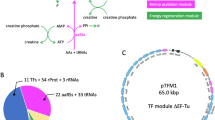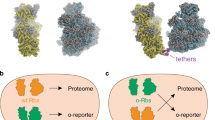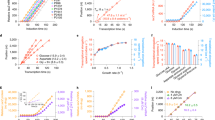Abstract
The 4.5S RNA of Escherichia coli is a small, stable RNA that is essential for cell growth but its function is not yet known. Its biosynthesis is stringently controlled, and it is processed by RNase P, a transfer RNA processing enzyme1–3. To identify the biological role of the 4.5S species, we have characterized the physiological changes that occur when the bacterial cell is depleted of this RNA. We used a strain of E. coli in which synthesis of the 4.5S RNA can be turned off by removing an inducer of the lac operon, resulting in cell death4. We report here that an early consequence of depriving the cell of 4.5S RNA is the accumulation of translationally-defective ribosomes, which maintain their ability to elongate polypeptide chains, but can no longer participate in the initiation of protein synthesis.
This is a preview of subscription content, access via your institution
Access options
Subscribe to this journal
Receive 51 print issues and online access
$199.00 per year
only $3.90 per issue
Buy this article
- Purchase on Springer Link
- Instant access to full article PDF
Prices may be subject to local taxes which are calculated during checkout
Similar content being viewed by others
References
Ikemura, T. & Dahlberg, J. J. biol. Chem. 248, 5033–5041 (1973).
Ikemura, T., Shimura, Y., Sakara, H. & Ozeki, H. J. molec. Biol. 96, 69–86 (1975).
Bothwell, A. L. M., Garber, R. L. & Altman, S. J. biol. Chem. 251, 7709–7716 (1976).
Brown, S. & Fournier, M. J. J. molec. Biol. 178, 533–550 (1984).
Brown, S. & Fournier, M. J. (manuscript in preparation).
Brosius, J. & Holy, A. Proc. natn. Acad. Sci. U.S.A. 81, 6929–6933 (1984).
Brent, R. & Ptashne, M. Proc. natn. Acad. Sci. U.S.A. 78, 4204–4208 (1981).
Chen, H-Z. & Zubay, G. Meth. Enzym. 101, 674–690 (1983).
Baranov, V. I., Belitsina, N. V. & Spirin, A. S. Meth. Enzym. 59, 382–397 (1979).
Hsu, L. M., Zagorski, J. & Fournier, M. J. J. molec. Biol. 178, 509–531 (1984).
Lindahl, L. J. molec. Biol. 92, 15–37 (1975).
Griffin, B. E. J. biol. Chem. 250, 5426–5437 (1975).
Lee, S. Y., Bailey, S. C. & Apirion, D. J. Bact. 133, 1015–1023 (1978).
Held, W. A. & Nomura, M. Biochemistry 12, 3273–3276 (1973).
Spillman, S., Dohme, F. & Nierhaus, K. H. J. molec. Biol. 115, 513–535 (1977).
Neidhardt, F. C., Bloch, P. L. & Smith, D. F. J. Bact. 119, 736–747 (1974).
Chambliss, G. H., Henkin, T. M. & Leventhal, J. M. Meth. Enzym. 101, 598–605 (1983).
Author information
Authors and Affiliations
Rights and permissions
About this article
Cite this article
Bourgaize, D., Fournier, M. Initiation of translation is impaired in E. coli cells deficient in 4.5S RNA. Nature 325, 281–284 (1987). https://doi.org/10.1038/325281a0
Received:
Accepted:
Issue Date:
DOI: https://doi.org/10.1038/325281a0
This article is cited by
-
Essential is Not Irreplaceable: Fitness Dynamics of Experimental E. coli RNase P RNA Heterologous Replacement
Journal of Molecular Evolution (2014)
-
TheBacillus subtilis small cytoplasmic RNA gene and ‘dnaX’ map near the chromosomal replication origin
Molecular and General Genetics MGG (1990)
-
Structure of the archaebacterial 7S RNA molecule
Molecular and General Genetics MGG (1990)
-
Transcription and processing of Bacillus subtilis small cytoplasmic RNA
Molecular and General Genetics MGG (1989)
Comments
By submitting a comment you agree to abide by our Terms and Community Guidelines. If you find something abusive or that does not comply with our terms or guidelines please flag it as inappropriate.



